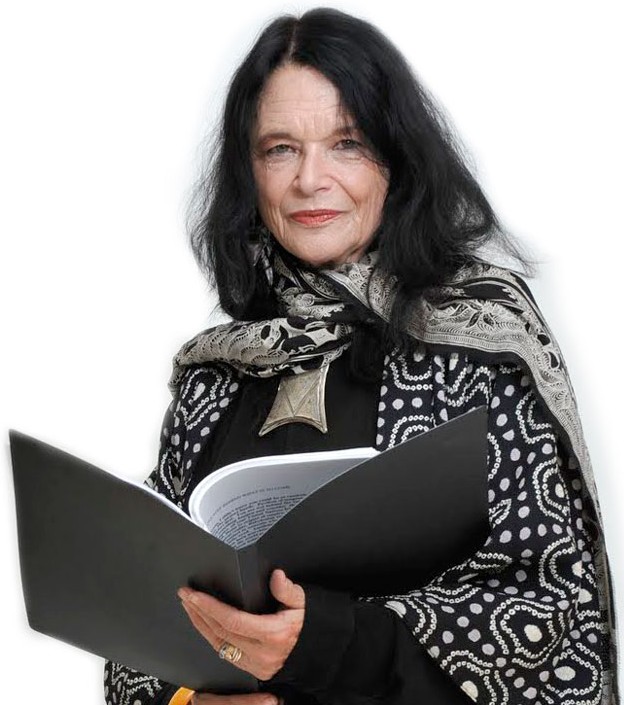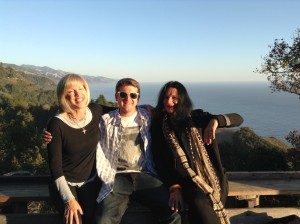Here’s a sneak peak at the interview I conducted with Anne Waldman forthcoming in this issue of Ping-Pong! I am also apoplectic with joy that she will be performing and giving a workshop at our 2 Day Speech is Not Free event!
ARTIST ON THE PULSE: Interview with Anne Waldman
by: MARIA GARCIA TEUTSCH
MGT: What is the role of the artist in the 21st century?
ANNE: I believe it is to help wake the world up to itself. To point out the beauties, the possibilities, the extraordinary power of empathy and love, in art and in life, as well as the horrors of our greed and ignorance, our inhumanity and cruelty, and unspeakable injustices in a world that should know better from the harrowing legacy of slavery and war and climate degradation. The horrors of seeing the image of Kurdish child Aylan Kurdi, washed up on the beach should reverberate and change the frequency (one would think!) Innocent victim of Syria’s dystopia, drowned in the Aegean fleeing Kobane and Isis. What next? What will it take after Katrina, after Ferguson on our own turf, after the endless wars, and countless other wake up calls everywhere? Artists need to stay on the pulse, be vocal in their lives; it’s not about “political poetry” and compliant as such … Do something constructive as alarums. See where you have voice and can reverberate and articulate your care, your concern and tenderness as well.
MGT: What characteristics in who you are today can you attribute directly to your parents.
ANNE: A love and respect for artists and poetry and community and flashes of insight that can shift one’s consciousness. A scrappy ethos of working hard and survival. My mother, born in PA. to a widowed mother who had converted to Christian Science, left America at age 19 in 1939 for Greece with her first husband, Glaufkos who was the son of the celebrated Greek poet Anghelos Sikelianos. And she learned Greek, and learned to weave and was very close to her mother-in-law Eva Palmer who produced Greek festivals, and was part of this generative Delphic Ideal, an utopian community that believed that the world would change through the arts. My father was an itinerant musician, lived in Provincetown next door to John Dos Passos, was close to Mary Heaton Vorse (his first mother-in-law), the labor writer who worked with John Reed. He then served in Germany, WWII 2 (my mother was pregnant with me on Macdougal Street in Greenwich Village), and later went to school on the GI Bill, PhD at Columbia in English, became a professor. His people were glass blowers in South Jersey.
MGT: Your chant for world peace is a continuing and ever growing project that has influenced generations through your words, music, and presence. What was your first experience with chanting? Specifically, when, if ever, did you feel it evoking the names of energies?
ANNE: They wake up the chakras, and as in “Om Ah Hum”, locate the centers of “body, “speech” and “mind”. I also enjoy Sprechstimme and have evolved my own- at times, operatic, modal structures. I sang as a child.
MGT: Who is the best storyteller you have ever met?
ANNE: Lucia Berlin is pretty great.
MGT: In Bali there is no word for art because it is inextricable from the culture, where do you see this kind of manifestation in the U.S? Certainly it is part of the Naropa program you founded with Ginsberg, where else do you see it play out?
ANNE: Yes, when I worked in Bali with the Naropa Study Abroad program this struck me every day. How integrated the spiritual ethos was as well, also inextricably linked to art and quotidian demands. But Bali also went through some dark times. I see it played out in my own life, in the little cultures one can help create, in my work with my family, in collaboration with my husband, filmmaker Ed Bowes, in work with my son Ambrose Bye, and Devin Waldman, my nephew, both musicians, and partners in the Fast Speaking Music productions and label. In our work together for Pathway to Paris–the climate change, de-carbonization movement, leading to the UN talks in Paris this December. At Naropa as you note especially when we are in the throes of the Summer Writing Program with all the activity in the recording studio, the printshop, the classrooms, late night discourse. I see these kinds of mini-cultures of activity and promise all over the world, in artist communities and political communities and dharmic communities of spiritual practice, which engage artists and visionaries everywhere. In people growing herbs and tending the earth.
MGT: Can you tell us about your documentary Outrider? How has being an outrider evolved over the years? How do you see it evolving in the future?
ANNE: It is still in the works and one can see a trailer that director Alystyre Julian has worked on. She hopes to complete the project in 2016-17. Outrider rides alongside the mainstream, working from the margins in a sense. One gets more astute about how that works. How much you can collaborate, be most effective. You don’t want to be a machination for Empire.
MGT: How can our voices change the world?
ANNE: Not sure how this works and can’t make any predictions, but poetry over the years has altered my own consciousness.
MGT: How can we achieve peace? Through symbiosis? It is hard to understand why we continue to kill each other when we are all interconnected. Your poetry shows me this interconnectedness, what can we do to foster these kinds of awarenesses?
ANNE: I think it takes a certain level of experience to really understand symbiosis. I think the erratic weather (as a result of emissions and changing climate) is waking some people up. I have experienced this through the flood in Boulder, worrying about the Naropa audio archives (we are on a floodplain) the flooding in New York and other parts with hurricane Sandy. Bailing water out of yards, houses, hunting down candles for the blackouts, watching the geography shift, the loss of precious artwork by artist friends: Laurie Anderson’s basement with 13 feet of water. To be thrown into chaos gives people pause to know how dependent we are on one another and on our delicate raging planet, so angry at us for not taking better care.
Anne Waldman The author of more than 40 collections of poetry and poetics, Anne Waldman is an active member of the Outrider experimental poetry movement, and has been connected to the Beat movement and the second generation of the New York School. Her publications include Fast Speaking Woman (1975), Marriage: A Sentence (2000), and the multi-volume Iovis project (1992, 1993, 1997).
Her work as a cultural activist and her practice of Tibetan Buddhism are deeply connected to her poetry. Waldman is, in her words, “drawn to the magical efficacies of language as a political act.” Her commitment to poetry extends beyond her own work to her support of alternative poetry communities. Waldman has collaborated extensively with visual artists, musicians, and dancers, and she regularly performs internationally. Her performance of her work is engaging and physical, often including chant or song, and has been widely recorded on film and video. www.annewaldman.org


